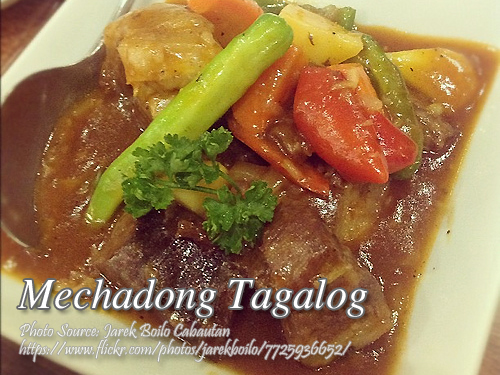This mechado recipe is a classic Filipino beef stew recipe which uses fresh tomatoes instead of tomato sauce or tomato paste. And instead of liver spread, this mechadong tagalog dish uses beef liver. The ingredients are very basic and simple so it will be easy for you to get the ingredients. The cooking process is also simple and it will be easy for you to cook this dish anytime on any occasions.
Mechadong Tagalog: A Comfort Dish That Feels Like Home
There’s something about a simmering pot of mechado on a lazy Sunday afternoon that instantly takes me back to my childhood in Batangas. The aroma alone brings me straight to my Lola Nena’s kitchen, where she’d hum old kundiman songs while stirring the stew with her worn wooden ladle. Her version of mechadong tagalog was simple but full of heart — no fancy tomato sauce or shortcuts, just fresh tomatoes and beef liver that gave the dish its deep, earthy flavor.
A Taste of Home and Family Tradition
I learned to cook this dish not from a cookbook, but from watching my Uncle Lito during family reunions. He’d always say, “Ang sikreto sa mechado, tiyaga lang at tamang timpla.” True enough, patience is key. When I first tried making it on my own, I thought it was just a matter of throwing ingredients in a pot. But after rushing the process, the beef turned out tough and the sauce too watery. It was only after following Uncle Lito’s steps — slowly browning the meat and letting it simmer — that I finally captured that comforting flavor I grew up with.
Why This Mechadong Tagalog Recipe Works
This version of mechadong tagalog stands out because it sticks close to the roots of the dish. Instead of relying on tomato sauce or paste, we use fresh, ripe tomatoes sautéed until they break down and form a natural sauce. This gives the stew a brighter, fresher taste — something that canned tomato products can’t quite replicate. The use of beef liver instead of liver spread might surprise some, but that’s where the magic happens. Searing the liver first seals in its flavor and adds richness to the sauce once simmered with the beef.
It’s a technique that makes a big difference. Stir-frying the beef before simmering helps develop a deep, savory flavor through caramelization — that’s when the surface of the meat browns and builds that unmistakable “lutong bahay” taste. Beginners often skip this step, but trust me, it’s worth the few extra minutes.
A Bit of Mechado History
Before we had cans of tomato sauce on grocery shelves, traditional Filipino households relied on local ingredients. Mechado actually traces its roots to the Spanish colonial period, from the word mecha, meaning “wick.” The original version used strips of pork fat inserted into beef chunks, resembling a candle’s wick, to keep the meat moist during slow cooking. Over time, regions across the Philippines adapted it — and the mechadong tagalog we know today is a heartwarming reflection of that evolution: simple, flavorful, and proudly local.
Cooking the Classic at Home
When my cousin May came home from Quezon last summer, she brought a basket of bright red native tomatoes from her backyard garden. We decided to make mechado the old-fashioned way. As the garlic and onions sizzled in the pan, the smell drew everyone into the kitchen. The secret, as Lola used to say, was to sauté until the onions turned translucent and the tomatoes softened just enough to release their juices. That’s when you know the base is ready for the beef.
After stir-frying the beef and liver, we added a splash of soy sauce for depth and a generous pour of annatto extract for that signature reddish-orange glow. The kitchen felt alive with color and scent — it was as if we were stirring memories into every spoonful. Once the beef became tender, we tossed in bell peppers for sweetness and garnished the dish with fried potatoes and fresh celery. The first taste was exactly as I remembered: rich, hearty, and full of comfort.
Why You’ll Love This Dish
If you’re new to Filipino cooking, mechadong tagalog is one of the best dishes to start with. It’s forgiving, adaptable, and easy to master once you get the hang of timing and texture. You can use cheaper cuts of beef like brisket or chuck, as the long simmering tenderizes them beautifully. The result is a dish that pairs perfectly with hot steamed rice — a meal that feels like home, no matter where you are.
Food for Thought
What I love most about cooking mechado isn’t just the taste but the tradition it carries. Every family has its own version, and every version has a story. For me, it’s a reminder of how food connects generations — from Lola Nena’s kitchen in Batangas to my own small kitchen today. In every bite of this classic stew, I taste history, family, and the timeless joy of sharing good food with the people you love.
So the next time you crave something comforting and authentically Filipino, try this humble but flavorful mechadong tagalog. It’s more than a recipe — it’s a delicious piece of our heritage.
How to Cook Mechadong Tagalog
Ingredients
- 1/2 kilo lean beef cubed
- 1/2 kilo beef liver sliced
- 1 head garlic minced
- 2 pcs onion chopped
- 1/2 kilo tomatoes chopped
- 2 Tbsp. cooking oil
- 1 tsp. soy sauce
- 1 tsp. black pepper ground
- 2 Tbsp. annatto seeds achuete seeds, soaked in 1 cup warm water, remove the seeds
- 2 pcs red bell peppers sliced
- 2 pcs green bell peppers sliced
- 6 pcs small potatoes peeled, quartered and fried
- 1 stalk celery sliced
Instructions
How to Cook Mechadong Tagalog:
- Heat oil in a frying pan and stir fry beef and liver. Set aside.
- Saute garlic, onions and tomatoes in hot oil until soft.
- Combine meat mixture and season with soy sauce and pepper. Mix well.
- Pour 1 cup of annatto extract. Cover and let boil.
- Lower heat and simmer until the meat is tender. Add more water if necessary.
- Add the bell peppers and let it simmer for a minute.
- Garnish with fried potatoes and celery. Serve hot.
Notes
Cooking Tips:
Brown the Meat for Deeper Flavor
Don’t rush this step — browning the beef before simmering builds a rich, savory base. The caramelized bits at the bottom of the pan dissolve into the sauce, giving your mechado that deep “lutong bahay” taste. This technique also locks in the juices, keeping the beef tender and flavorful.Use Fresh Tomatoes for a Brighter Sauce
Fresh tomatoes bring out a natural sweetness and tang that canned sauce can’t match. When sautéed properly until soft and pulpy, they create a lighter but more vibrant stew. This gives your mechadong tagalog that fresh, home-cooked flavor many Filipinos grew up loving.Simmer Low and Slow for Tender Meat
Patience is key when cooking mechado. A gentle simmer allows the beef fibers to break down gradually, resulting in melt-in-your-mouth tenderness. Rushing the process will toughen the meat, so let time do its magic for the perfect mechadong tagalog.





